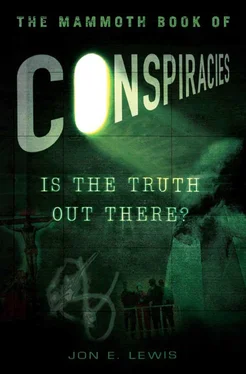Berckheim then proceeds to show that those writers on Illuminism were mistaken who declared that political assassinations were definitely commanded by the Order:
There is more than exaggeration in this accusation; those who put it forward, more zealous in striking an effect than in seeking the truth, may have concluded, not without probability, that men who surrounded themselves with profound mystery, who propagated a doctrine absolutely subversive of any kind of monarchy, dreamt only of the assassination of sovereigns; but experience has shown (and all the documents derived from the least suspect sources confirm this) that the “Illuminés” count a great deal more on the power of opinion than on assassination; the regicide committed on Gustavus III is perhaps the only crime of this kind that Illuminism has dared to attempt, if indeed it is really proved that this crime was its work; moreover, if assassination had been, as it is said, the fundamental point in its doctrine, might we not suppose that other regicides would have been attempted in Germany during the course of the French Revolution, especially when the Republican armies occupied the country?
The sect would be much less formidable if this were its doctrine, on the one hand because it would inspire in most of the “Illuminés” a feeling of horror which would triumph even over the fear of vengeance, on the other hand because plots and conspiracies always leave some traces which guide the authorities to the footsteps of the prime instigators; and besides, it is the nature of things that out of twenty plots directed against sovereigns, nineteen come to light before they have reached the point of maturity necessary to their execution.
The “Illuminés” line of march is more prudent, more skilful, and consequently more dangerous; instead of revolting the imagination by ideas of regicide, they affect the most generous sentiments: declamations on the unhappy state of the people, on the selfishness of courtiers, on measures of administration, on all acts of authority that may offer a pretext to declamations as a contrast to the seductive pictures of the felicity that awaits the nations under the systems they wish to establish, such is their manner of procedure, particularly in private. More circumspect in their writings, they usually disguise the poison they dare not proffer openly under obscure metaphysics or more or less ingenious allegories. Often indeed texts from Holy Writ serve as an envelope and vehicle for these baneful insinuations…
By this continuous and insidious form of propaganda the imagination of the adepts is so worked on that if a crisis arises, they are ready to carry out the most daring projects.
Another Association closely resembling the “Illuminés”, Berckheim reports, is known as the “Idealists”, whose system is founded on the doctrine of perfectibility; these kindred sects “agree in seeing in the words of Holy Scripture the pledge of universal regeneration, of an absolute levelling down, and it is in this spirit that the sectarians interpret the sacred books.”
Berckheim further confirms the assertion I made in “World Revolution”—contested, as usual, by a reviewer without a shred of evidence to the contrary—that the Tugendbund derived from the Illuminati. “The League of Virtue,” he writes, “was directed by the secondary chiefs of the ‘Illuminés’… In 1810 the Friends of Virtue were so identified with the ‘Illuminés’ in the North of Germany that no line of demarcation was seen between them.”
But it is time to turn to the testimony of another witness on the activities of the secret societies which is likewise to be found at the Archives Nationales. This consists of a document transmitted by the Court of Vienna to the Government of France after the Restoration, and contains the interrogatory of a certain Witt Doehring, a nephew of the Baron d’Eckstein, who, after taking part in secret society intrigues, was summoned before the judge Abel at Bayreuth in February, 1824. Amongst secret associations recently existing in Germany, the witness asserted, were the “Independents” and the “Absolutes”; the latter “adored in Robespierre their most perfect ideal, so that the crimes committed during the French Revolution by this monster and the Montagnards of the Convention were in their eyes, in accordance with their moral system, heroic actions ennobled and sanctified by their aim.” The same document goes on to explain why so many combustible elements had failed to produce an explosion in Germany:
The thing that seemed the great obstacle to the plans of the Independents… was what they called the servile character and the dog-like fidelity [“Hundestreue”] of the German people, that is to say, that attachment—innate and firmly impressed on their minds without even the aid of reason—which that excellent people everywhere bears towards its princes.
A traveller in Germany during the year 1795 admirably summed up the matter in these words:
The Germans are in this respect [of democracy] the most curious people in the world … the cold and sober temperament of the Germans and their tranquil imagination enable them to combine the most daring opinions with the most servile conduct. That will explain to you… why so much combustible material accumulating for so many years beneath the political edifice of Germany has not yet damaged it. Most of the princes, accustomed to see their men of letters so constantly free in their writings and so constantly slavish in their hearts, have not thought it necessary to use severity against this sheeplike herd of modern Gracchi and Brutuses. Some of them [the princes] have even without difficulty adopted part of their opinions, and Illuminism having doubtless been presented to them as perfection, the complement of philosophy, they were easily persuaded to be initiated into it. But great care was taken not to let them know more than the interests of the sect demanded.
It was thus that Illuminism, unable to provoke a blaze in the home of its birth, spread, as before the French Revolution, to a more inflammable Latin race—this time the Italians. Six years after his interrogatory at Beyreuth, Witt Doehring published his book on the secret societies of France and Italy, in which he now realized he had played the part of dupe, and incidentally confirms the statement I have previously quoted, that the Alta Vendita was a further development of the Illuminati.
In 1997 Michael Drosnin published The Bible Code , in which he claimed that the holy book predicted events thousands of years before they occurred. Drosnin had decoded the Good Book to send a letter to Itzhak Rabin, the Israeli PM, warning him that he was going to be assassinated. Which he duly was.
Drosnin himself was not the discoverer of the code, only its popularizer. Bible decoding could be said to start with Jewish Kabbalists in the fourteenth century, who believed that hidden truths in the Torah could be determined by manipulation of its letters, including geometric computation (known as “Gematra”). In the 1940s, Czech rabbi H. M. D. Weissmandel applied a “skip code” to the Bible, taking the letter from the start of Genesis, “skipping” fifty letters to take the next letter, then fifty more, and fifty more until the world spelled “Torah”. The word was also found in each of the other five books of Moses. Using the same system, the Jerusalem-based mathematician Eliyahu Rips, together with Yoav Rosenberg and Doron Witzum, unearthed the names of famous rabbis in the Book of Genesis in close proximity to the dates of their births and deaths, in a way that could not be explained by chance (allegedly), as outlined in their paper “Equidistant Letter Sequences in the Book of Genesis” in Statistical Science . Rips later used “Equidistant Letter Sequencing” (ELS) to turn up the date 18 January 1991—the start of the Gulf War.
Читать дальше











